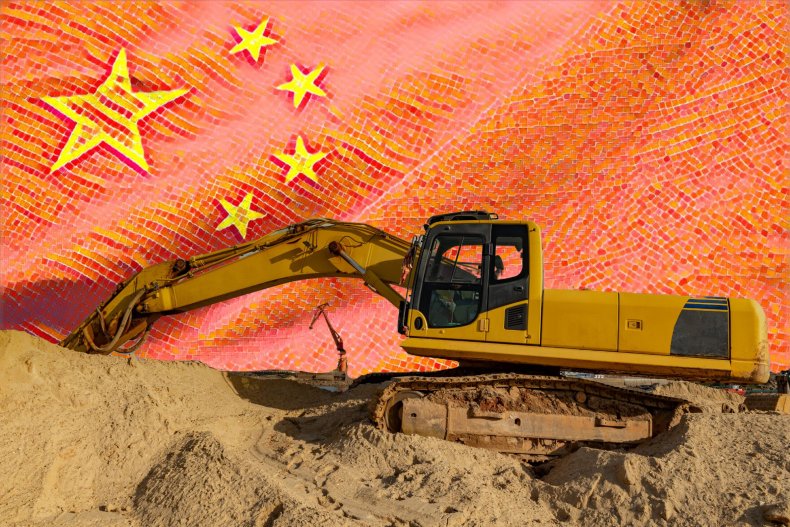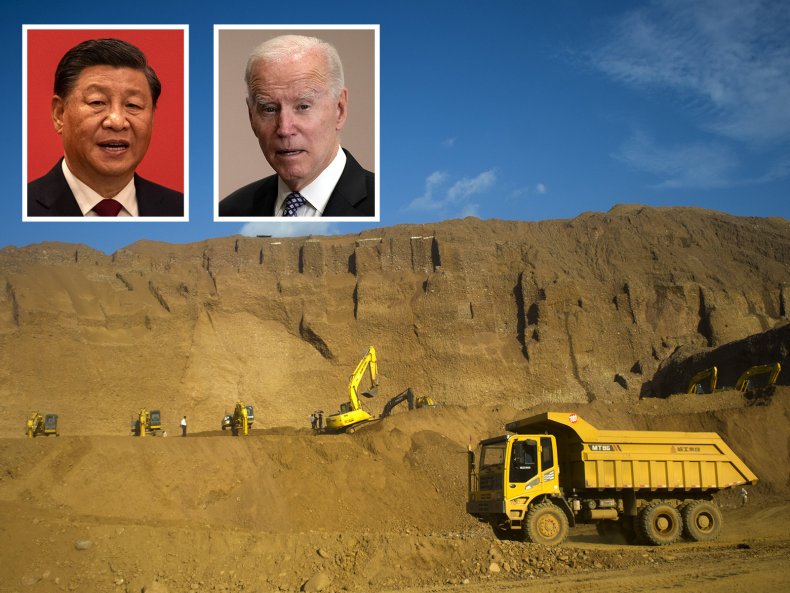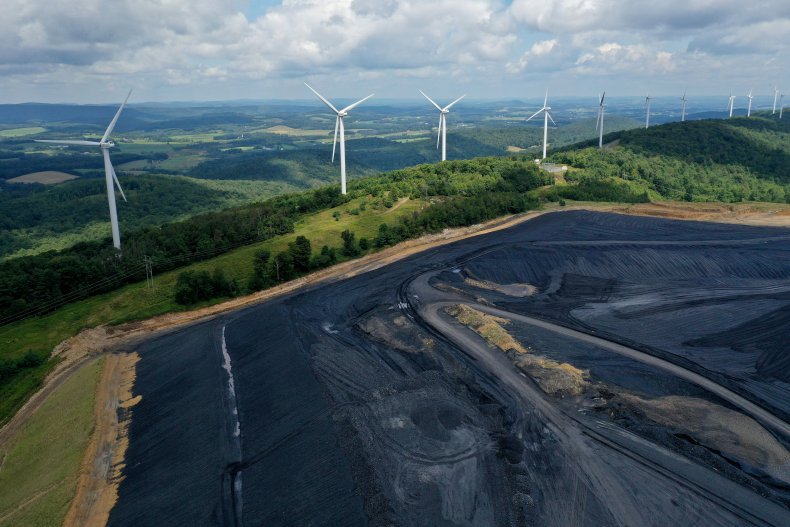JOHN FENG
After decades of geopolitical tensions over access to oil, the transition to clean energy is setting up a global competition over another natural resource: rare earth elements.
The 17 metals, which aren't scarce but are hard to find in economically viable concentrations, are significant to greening economies of the future and the defense industrial base of the United States and others.
America's heavy reliance rare earth imports—indispensable in the production of wind turbines and electric vehicles, but also advanced fighter aircraft and precision-guided munitions—has been identified as a serious strategic vulnerability, especially at a time when the global supply chain is comprehensively dominated by its foremost rival, China.
The U.S. lists dozens of critical minerals including rare earths as vital to its economic security: lithium, cobalt, nickel and manganese for EV batteries; copper and aluminium for power grids; dysprosium and terbium for missiles and jet engines; as well as neodymium, praseodymium, dysprosium and terbium for magnets and semiconductors.
Observers say the contest over the composition of tomorrow's supply chain—from extradition to refinement—could be as intense as energy crises of the past, such as the 1970s Arab oil embargo that sent prices surging in the U.S., or Europe's current Russian gas crunch.
The Biden administration's recently published national security strategy has already identified rare earth supply chains as a major issue. A 2021 Defense Department review concluded that overreliance on China "creates risk of disruption and of politicized trade practices" that would hit commercial sectors particularly hard.
But it wasn't always this way. American military scientists created the rare earths industry in World War II, but a combination of market forces and environmental concerns pushed production abroad. Now the U.S. operates only one rare earth mine and has no processing capability, although this is slowly changing.
Officials in Beijing, meanwhile, have spent three decades capitalizing on the opening presented to them. Deng Xiaoping, China's economic reformist leader of the 1980s, knew critical minerals would one day be just as important as petroleum is to the Middle East.
"They have immense strategic significance and we must certainly deal with rare earths issues with care, unleashing the advantages they bring," he was recorded as saying in 1992.
 The United States and its allies could end China's monopoly on the global rare earth elements market.GETTY IMAGES/NEWSWEEK
The United States and its allies could end China's monopoly on the global rare earth elements market.GETTY IMAGES/NEWSWEEKA Risky Dependence on China
China's monopoly on rare earths has been on Capitol Hill committee agendas for well over a decade; its role in the global supply chain is huge. That role begins with an abundance of domestic facilities that process local- or foreign-sourced raw material and ends with the country's status as the world's top exporter—and the U.S. as its top client.
Analysis by the Paris-based International Energy Agency (IEA) suggests China accounts for 60 percent of global rare earth extraction and 87 percent of processing. It's nothing short of a national priority for Beijing. In contrast, U.S. rare earth mining is roughly 15 percent of global production.
"The risk of supply chain disruptions and volatile prices is exacerbated by the fact that clean energy technology supply chains are highly concentrated," the IEA said in its latest World Energy Outlook.
The risk is even more acute for the U.S. economy, whose high-tech sectors imported 78 percent of their rare earth metals from China between 2017 and 2020, according to the U.S. Geological Survey.
John Coyne, head of the Northern Australia Strategic Policy Center at the Australian Strategic Policy Institute, a think tank, said Beijing's control of the market "didn't happen by accident."
"That dominance leaves the market and the U.S. open to being impacted by domestic Chinese policy, and the reliance can't be regulated by free market forces," Coyne told Newsweek.
A 2018 Pentagon report observed that China had "strategically flooded the global market with rare earths at subsidized prices, driven out competitors and deterred new market entrants."
"When China needs to flex its soft power muscles by embargoing rare earths, it does not hesitate," it concluded, pointing to Beijing's unofficial mineral embargo against Tokyo in 2010 following a flare-up around the Japan-controlled Senkaku Islands in the East China Sea.
Japan, a key U.S. treaty ally in Asia, has a sizeable heavy industry of its own. Beijing later lifted its export controls after Washington, Brussels and Tokyo brought the case to the World Trade Organization, which ruled against China in 2014.
In the meantime, Japan was forced to look elsewhere and has recently made plans to reduce its reliance on Chinese rare earth imports to less than 50 percent by 2025.
 A combination image of Chinese President Xi Jinping, Joe Biden and construction vehicles being used by workers at a jade mine in Hpakant, in Myanmar's Kachin State.
A combination image of Chinese President Xi Jinping, Joe Biden and construction vehicles being used by workers at a jade mine in Hpakant, in Myanmar's Kachin State.Tensions over mineral acquisition are unlikely to lead to direct conflict at present, and supply cut-offs are likely to hit China's exporters just as hard. However, analysts do expect Beijing to use its rare earths monopoly to improve its strategic posture.
A Bloomberg report in 2019 indicated that China had drawn up plans to restrict rare earth exports to the U.S., to be executed when necessary, as part of the intensifying trade war.
Global disruptions amid the COVID-19 pandemic have also brought supply chain resilience to the forefront of policymaking. In July, Treasury Secretary Janet Yellen said it was imperative the U.S. not let China use its market position "to disrupt our economy or exercise unwanted geopolitical leverage."
It's a hole Washington needs to plug, but it could take a decade or more.
Kick-Starting Rare Earth Resilience
Different administrations may focus more or less on national defense or the climate crisis, but there's bipartisan support in the U.S. for securing the supply of rare earth elements, said Jane Nakano, a senior fellow in the Energy Security and Climate Change Program at the Center for Strategic International Studies, a U.S. think tank.
The government has its own stockpile for defense production, while recent demand has been driven by the transition to renewal energy, she told Newsweek.
Solar, wind, hydro and geothermal energy infrastructure is expected to spike in the coming decades, leading to a quadrupling of demand for critical minerals by 2040, according to the IEA.
In February, the Biden administration unveiled plans to build a wholly domestic supply chain for rare earth magnets.
Las Vegas-headquartered MP Materials was awarded a $35 million Pentagon contract to construct a heavy rare earth elements processing facility at Mountain Pass, California, where the company currently operates the country's only rare earth mine. In 2020, MP Materials was awarded a separate $9.6 million contract to restore light rare earth elements processing at the same site.
Feedstock sourced from Mountain Pass will help manufacture alloy and magnets for General Motors EV fleets at a new plant in Fort Worth, Texas, from late 2023, according to a deal announced last year.
Australia's Lynas Rare Earths, the world's largest producer outside China, has also been brought in to help shore up America's supply of critical minerals. In June, the mining company was awarded a $120 million contract to build the first commercial heavy rare earth elements separation facility in the U.S. Last year, as part of a separate $30.4 million agreement, Lynas was contracted to construct a light rare earth elements processing facility.
Both projects, which are expected to come online in 2025, would be co-located in an industrial area on the Texas Gulf Coast, said Lynas, which could produce up to one-quarter of the world's rare earth elements.
With raw material being extracted from a Lynas mine in Mount Weld, Australia, and shipped to the U.S. for refinement, the supply chain would bypass China.
 Wind turbines from the Roth Rock wind farm spin on the spine of Backbone Mountain next to the Mettiki Coal processing plant on August 23, 2022, in Oakland, Maryland.CHIP SOMODEVILLA/GETTY IMAGES
Wind turbines from the Roth Rock wind farm spin on the spine of Backbone Mountain next to the Mettiki Coal processing plant on August 23, 2022, in Oakland, Maryland.CHIP SOMODEVILLA/GETTY IMAGES"China is acting outside of the market to maintain its level of control, so any solution for rare earths is too big for any single nation to address," Coyne said. "The solution must be through a form of minilateralism," he said, meaning a small grouping of nations that share common strategic interests.
Since assuming office, Biden's multilateral agenda to strengthen alliances and partnerships has also involved notable minilateral components, such as the elevation of the Quad (U.S., Australia, India, Japan) and the creation of AUKUS (Australia, U.K., U.S.).
To ensure American and allied primacy in high-end semiconductor research and production, the U.S. also roped in three Asian allies for a collaboration known as the "Chip 4" (U.S., South Korea, Japan, Taiwan), which convened its first working group talks in October.
As allies that share a similar stake in rare earth elements, Australia, the U.S. and Japan could do more together to build a clean and secure supply chain, said Coyne, who echoed Yellen's calls for America to practice more "friend-shoring."
For Western companies looking to safeguard their supply chains from geopolitics, it could take the U.S. and Australia eight to 10 years to turn a mine into something that contributes to the value chain. "That's a long time to wait. In the meantime, you're vulnerable to Chinese economic coercion and punishment," he said.
"Some markets are not going to jump ship to new suppliers overnight, so I think a smaller group of like-minded countries could invest heavily with equity, knowing that it would take eight years to get the technology right," Coyne argued. But even then, it would be difficult to compete with Chinese rare earth prices.
"There's a premium cost to be paid for this," Coyne said. "The U.S. is looking at the market and saying market forces won't provide us with economic resilience and a secure supply chain. But we believe it's important, so we're ready to test it, and certainly we've seen that with the U.S. and Lynas."
No comments:
Post a Comment